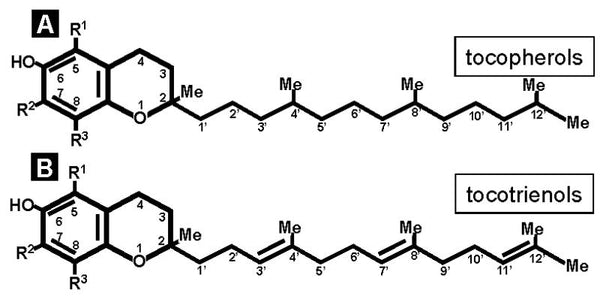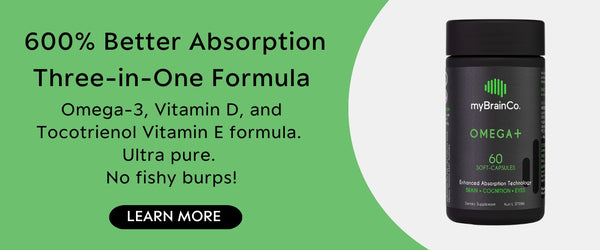Vitamin E is a well-known vitamin, but did you know that there are multiple forms of this vitamin, each with its own unique properties?
Whilst vitamin E might not be the first vitamin you think of when it comes to nootropics, emerging research suggests that specific forms of vitamin E may exert a range of health benefits that positively influence long-term brain wellbeing.
When we talk about Vitamin E, it's important to distinguish between two main groups: tocopherols and tocotrienols. Tocopherols have traditionally been the most common form of vitamin E found in supplements, however, emerging research is now suggesting that tocotrienols are a superior choice when it comes to vitamin E.
Tocopherols vs. Tocotrienols: What's the Difference?
Vitamin E is a collective term for eight naturally occurring molecules: four tocopherols (alpha, beta, gamma, and delta) and four tocotrienols (alpha, beta, gamma, and delta). While they are structurally similar, they differ in their chemical structures, specifically their side chains.

Tocopherols have a saturated side chain, whereas tocotrienols have an unsaturated side chain. This differentiation is not just chemical jargon; it significantly influences their biological activities and impact on brain health.
Therapeutic Advantages of Tocotrienols
Neuroprotection:
Unlike tocopherols, tocotrienols, particularly the delta and gamma forms, have been shown to provide neuroprotective effects. Evidence suggests that tocotrienols help to protect neural cells from damage due to their fat-penetrating antioxidant properties and ability to reduce neurotoxic insults, such as lipid peroxidation, which is a critical contributor to brain ageing and neurodegenerative disease.
Cardiovascular Health:
Healthy blood circulation is crucial for optimal brain function. Tocotrienols have a role in supporting cardiovascular health by facilitating healthy cholesterol profiles. Studies have demonstrated that tocotrienols can yield positive reductions in serum LDL (aka ‘bad’ cholesterol) by inhibiting an enzyme that is essential for cholesterol synthesis in the liver. By promoting cardiovascular health, tocotrienols can help to ensure a healthy flow of oxygen-rich blood will reach our brain to meet it’s nutrient and energy demands.
Metabolic Health Enhancement:
Brain function is closely linked with metabolic health. Proper glucose metabolism is vital for maintaining neuronal energy balance. Tocotrienols have been shown to enhance glucose metabolism by improving blood glucose markers such as fasting plasma glucose, glycosylated haemoglobin, insulin and insulin resistance. Furthermore, tocotrienols have also been shown to positively impact non-alcoholic fatty liver disease (NAFLD) which is commonly connected to poor blood sugar utilisation. Improvements in parameters of metabolic health ensure that the brain receives the energy it needs to function optimally.
Antioxidant Power:
Oxidative stress is a well-known culprit contributing to cognitive decline. Tocotrienols have demonstrated higher antioxidant capacity compared to tocopherols. In particular, tocotrienols have a greater ability to penetrate fattier tissues, like those of the brain and liver due to their unsaturated side chains. They are more efficient in quenching free radicals, which helps in preventing oxidative stress and thus safeguarding nerve structure and function.
Skin-Brain Connection:
Tocotrienols have been shown to help protect our skin from the damage that can be caused by ultraviolet (UV) rays. UV radiation can contribute to our total body burden of oxidative stress, and whilst this is damaging to skin health, it also adds to the systemic load of oxidative stress, which can spill over to impact our brain wellbeing. Positively reducing oxidative stress has a systemic impact on our health.
Anti-Inflammatory:
We know that inflammation is detrimental to our body and brain and is at the root of many chronic diseases. Tocotrienols have been shown to be capable of modulating inflammatory pathways and reducing the secretion of pro-inflammatory cytokines. Providing our body with the resources it can use to modulate and balance inflammation is a proactive approach to supporting long-term brain and nerve health.
Annatto Derived Tocotrienols: A Notch Above
When it comes to sourcing tocotrienols, not all sources are created equal. Annatto, a natural plant extract, is the only known source to provide tocotrienols without the presence of tocopherols. This is a highly desirable feature because tocopherols have been shown to interfere with the functions and absorption of tocotrienols.
Delta Gold® is a premium source of annatto-derived tocotrienols, ensuring a high-quality, pure tocotrienol product. Their extraction method preserves the highest concentration of delta and gamma tocotrienols, which have been identified as the most potent forms in scientific studies. By choosing Annatto-derived tocotrienols, consumers and practitioners can harness the maximum therapeutic and health benefits of this superior Vitamin E form.
While tocopherols have been the primary focus in the vitamin E realm for many years, it's evident that tocotrienols bring a range of potent therapeutic and health advantages to the table. As more research continues to emerge, it's likely we'll see an increasing shift towards the use and recognition of tocotrienols, particularly those derived from quality, sustainable sources like Annatto.
REFERENCES
Sen CK, Khanna S, Roy S. Tocotrienols: Vitamin E beyond tocopherols. Life Sci. 2006 Mar 27;78(18):2088-98.
Suleman F, Khan DA, Pervez MA, Aamir M. Effects of delta-tocotrienol supplementation on glycaemic control in individuals with prediabetes: A randomized controlled study. J Pak Med Assoc. 2022 Jan;72(1):4-7.
Pervez MA, et al. Hepato-Protective Effects of Delta-Tocotrienol and Alpha-Tocopherol in Patients with Non-Alcoholic Fatty Liver Disease: Regulation of Circulating MicroRNA Expression. International Journal of Molecular Sciences. 2023; 24(1):79.
Chin KY, et al. Tocotrienol in the Management of Nonalcoholic Fatty Liver Disease: A Systematic Review. Nutrients. 2023 Feb 6;15(4):834.
Sen C, et al. Molecular basis of vitamin E action: Tocotrienol modulates 12-lipoxygenase, a key mediator of glutamate-induced neurodegeneration. Journal of Biological Chemistry. 2000 Jul 6;275(50):38949-38955.
Suzuki, Y, et al. Structural and dynamic membrane properties of alpha-tocopherol and alpha-tocotrienol: Implication to the molecular mechanism of their antioxidant potency. Biochemistry. 1993;32(40):10692-10699.
Qureshi, A. et al. Lowering of serum cholesterol in hypercholesterolemic humans by tocotrienols (palmvitee). American Journal of Clinical Nutrition. 1991;53(4):1021S-1026S.
Serbinova E, et al. Free radical recycling and intramembrane mobility in the antioxidant properties of alpha-tocopherol and alpha-tocotrienol. Free Radical Biology and Medicine. 1991;10(5):263-275.

